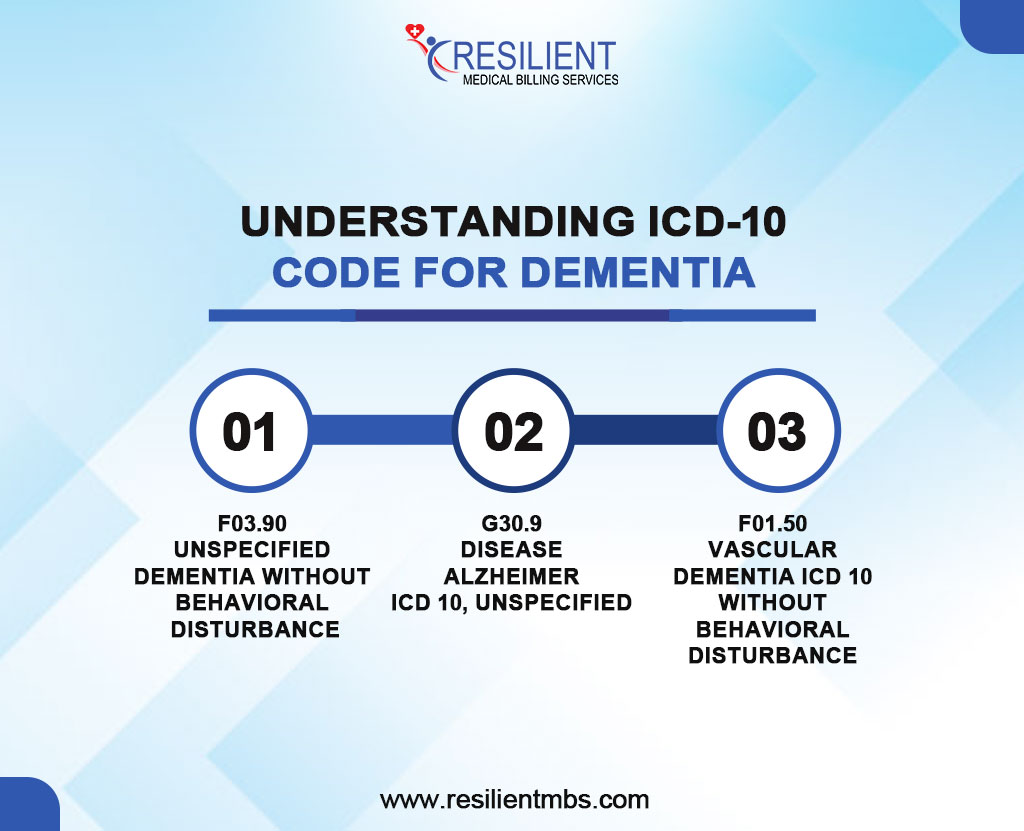Dementia is a condition that slowly damages the brain, making it harder for people to remember things, think, control their behavior, and do everyday tasks. As more people live longer, dementia is becoming more common and is now a major health concern around the world.
To give the right care and get proper payment from insurance, doctors and healthcare workers need to document dementia correctly. They use a system called ICD-10, which gives special codes to different diseases.
One of these codes is F03.90, which is used when a person has dementia but the exact type is not known, and there are no signs of unusual behavior. This code is important for diagnosis, treatment, and billing.
This blog explores the importance and application of the ICD 10 Code F03.90 and how it supports healthcare providers in delivering efficient and compliant care.
Understanding Dementia and ICD-10 Coding
What is Dementia?
Dementia is an umbrella term that encompasses a range of cognitive disorders, including Alzheimer’s disease, vascular dementia, Lewy body dementia, and frontotemporal dementia.
These conditions lead to a decline in memory, language skills, problem-solving abilities, and other cognitive functions severe enough to interfere with daily life. Dementia is not a normal part of aging and often requires long-term care and support.
ICD-10 Codes and Dementia Diagnosis
ICD-10 codes are standardized tools used across healthcare to document diagnoses, guide treatment, track disease trends, and ensure accurate billing. For dementia, these codes help distinguish between types and stages, improving care coordination and reimbursement.
Specified vs. Unspecified Dementia
Specified dementia codes, like G30.9 for Alzheimer’s disease, indicate a known cause and support more targeted care.
Unspecified dementia (F03.90) is used when dementia is diagnosed, but the exact cause is unknown or undocumented. This code allows providers to document cognitive decline even when full clinical details are unavailable, ensuring continuity of care and appropriate billing.
What is ICD-10 Code F03.90?
ICD-10 Code F03.90 is Unspecified Dementia Without Behavioral Disturbance.
ICD-10 code F03.90 is used when a person has dementia, but the exact type or cause isn’t known yet, and there are no signs of behavioral problems like aggression, confusion, or mood swings.
This code helps doctors record dementia symptoms such as memory loss, trouble thinking clearly, or difficulty with daily tasks while more testing or evaluations are being done to find out the specific cause.
When Is This Code Used?
Doctors use F03.90 when:
- A person clearly shows signs of dementia.
- The specific cause (like Alzheimer’s or another condition) hasn’t been diagnosed yet.
- The person isn’t showing behavior issues related to dementia.
- The diagnosis is still in the early stages or based on limited information.
This code helps make sure patients get the right care and follow-up, even when a full diagnosis isn’t available yet.
Documentation Requirements for Using F03.90
To use ICD-10 code F03.90 correctly, clinical records must include:

- Evidence of dementia-related cognitive impairment (e.g., memory loss, disorientation, language issues).
- A statement confirming the dementia is unspecified and without behavioral disturbances.
- A reason why a more specific diagnosis isn’t possible (e.g., limited data, awaiting test results).
Unspecified Dementia vs. Other Dementia Types
Understanding ICD-10 Code For Dementia – F03.90 ICD 10 vs. Specific Diagnoses
ICD-10 offers various codes to classify dementia based on cause and symptoms. Differentiating the ICD-10 code for dementia unspecified (F03.90) from more specific types is essential for accurate diagnosis, treatment, and billing.
F03.90 – Unspecified Dementia Without Behavioral Disturbance
Used when the cause of dementia is unknown and there are no behavioral symptoms. It is a default code when more detailed information is unavailable.
G30.9 – Alzheimer’s ICD 10, Unspecified
Refers to Alzheimer’s disease without further detail. Unlike F03.90, it indicates a known cause. It’s often paired with an F02 code to note behavioral symptoms.
F01.50 – Vascular Dementia ICD 10 Without Behavioral Disturbance
Represents dementia due to cerebrovascular disease or stroke. Requires clinical or imaging evidence of vascular damage and reflects a different treatment path from F03.90.
Other Relevant Codes
- F02.80/F02.81: Dementia due to other diseases, with/without behavioral symptoms.
- G31.84: Mild cognitive impairment may precede dementia.
- F10.27: Alcohol-induced persisting dementia.
These codes should be used when the dementia’s cause is known.
Key Differences
F03.90 is a general diagnosis used when specific details are lacking. Specific codes like G30.9 or F01.50 should be used when diagnostic evidence supports them, as they guide better care and accurate reimbursement.
Common Mistakes When Using the Dementia ICD-10 Code F03.90
Using F03.90 too often: This code should only be used when the exact type of dementia isn’t known. If the records mention Alzheimer’s or another specific type, a more accurate code should be used instead.
Missing proper documentation: F03.90 should only be used if the doctor’s notes clearly explain why the dementia type is unknown. Without this, it can cause problems with billing and insurance.
Ignoring behavior symptoms: F03.90 is for cases without behavior issues. If the patient shows aggression, agitation, or confusion, F03.91 (with behavioral disturbance) may be a better fit.
Mixing up early memory loss with dementia: Memory problems or mild cognitive impairment (MCI) are not the same as dementia. Use this code only when a formal dementia diagnosis is made.
Getting Dementia Coding Right – What You Need to Know
- Clear Documentation is Key
Doctors and healthcare providers should write down any behavior changes (like confusion or aggression), possible causes of dementia (like Alzheimer’s or Parkinson’s), and results from memory or thinking tests.
- Coders Must Look at the Whole Picture
Medical coders shouldn’t just focus on the diagnosis section. They need to review the entire medical record to understand the patient’s condition better.
- Teamwork Improves Accuracy
Good communication between doctors and coders helps make sure the right codes are used. Regular training on dementia coding also helps everyone stay up to date.
Why Accurate Dementia Coding Matters
Using the right code is important for several reasons:
Better Treatment: Doctors use codes to plan care and track how the condition is progressing.
Correct Insurance Claims: Insurance companies may reject or underpay claims if the code doesn’t match the records.
Coordinated Care: When codes are wrong or unclear, it’s harder for different care providers like neurologists, psychiatrists, and social workers to work together.
Doctors and Coders Share the Responsibility
Doctors need to provide clear, updated notes about the patient’s health. Coders must carefully read and apply the correct ICD-10 code, and ask questions if something is unclear.
Working together helps create a full and accurate picture of the patient, especially important in dementia care, where small details can make a big difference.
Closing Words
Using the correct dementia ICD-10 code, especially F03.90, takes careful attention, clear medical notes, and teamwork. When healthcare providers avoid common coding mistakes and keep records accurate, patients with dementia can get better care and support.
It’s also important to stay up to date with coding rules and continue learning. This helps prevent billing errors and improves the quality of care for people living with dementia.
If you need help with dementia coding or medical billing, contact Resilient MBS LLC. Our team is here to support accurate coding, proper payments, and better patient care.
FAQs
What is ICD-10 code F03.90 used for?
It’s used for unspecified dementia without behavioral disturbance when the dementia type isn’t identified.
How is F03.90 different from other dementia codes?
Unlike specific codes like Alzheimer’s (G30.9) or vascular dementia (F01.50), F03.90 is used when the cause is unknown.
Can F03.90 be used for Alzheimer’s disease?
No. Alzheimer’s has its own ICD-10 codes and should not be coded as F03.90.
What are the risks of using the wrong dementia code?
Miscoding can lead to claim denials, treatment delays, and inaccurate records.
Is F03.90 a final diagnosis?
Not always. It can be temporary until a more specific dementia type is diagnosed.










